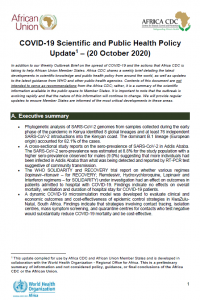
COVID-19 Scientific and Public Health Policy Update (20 October 2020)
Response
Description
A. Executive summary Phylogenetic analysis of SARS-CoV-2 genomes from samples collected during the early phase of the pandemic in Kenya identified 8 global lineages and at least 76 independent SARS-CoV-2 introductions into the Kenyan coast. The dominant B.1 lineage (European origin) accounted for 82.1% of the cases. A cross-sectional study reports on the sero-prevalence of SARS-CoV-2 in Addis Ababa. The SARS-CoV-2 sero-prevalence was estimated at 8.8% for the study population with a higher sero-prevalence observed for males (9.0%) suggesting that more individuals had been infected in Addis Ababa than what was being detected and reported by RT-PCR test suggestive of community transmission. The WHO SOLIDARITY and RECOVERY trial report on whether various regimes (lopinavir–ritonavir – for RECOVERY; Remdesivir, Hydroxychloroquine, Lopinavir and Interferon regimens – for SOLIDARITY) under investigation had an effect on outcomes in patients admitted to hospital with COVID-19. Findings indicate no effects on overall mortality, ventilation and duration of hospital stay for COVID-19 patients. A dynamic COVID-19 microsimulation model was developed to evaluate clinical and economic outcomes and cost-effectiveness of epidemic control strategies in KwaZulu-Natal, South Africa. Findings indicate that strategies involving contact tracing, isolation centres, mass symptom screening, and quarantine centres for contacts who test negative would substantially reduce COVID-19 mortality and be cost-effective.
